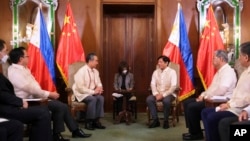New Philippine President Ferdinand Marcos Jr. met with China’s top diplomat Wednesday to take up long-simmering disputes in the South China Sea, as he waded into foreign policy dilemmas that include the U.S.-China rivalry in the region.
Chinese Foreign Minister Wang Yi, wearing a native Filipino formal shirt, met his counterpart for talks at the Department of Foreign Affairs in Manila and later met Marcos Jr. at the presidential palace.
No detailed statement about the talks was immediately released by Philippine officials. Chinese officials have frowned on what they perceive as undue media focus on the territorial conflicts that put Beijing in a bad light.
In Beijing, a Chinese Foreign Ministry statement quoted Wang as telling National Security Adviser Clarita Carlos in Manila that Marcos Jr.’s election “has turned a new page in China-Philippines relations, and the two peoples are full of expectations for the development of bilateral relations.” The statement did not say if the territorial disputes were taken up.
“Our only choice is to be friendly, friendly, and friendly again,” Wang said.
Wang arrived in Manila Tuesday night as part of a Southeast Asian swing that brought him earlier to Myanmar and Thailand. He will also visit Malaysia and Indonesia, where he will attend a meeting of G-20 foreign ministers in Bali.
Wang’s visit ushers Marcos Jr. early to touchy foreign diplomacy issues that often had prompted his predecessors to carry out delicate balancing acts. Marcos Jr. was sworn into office last week after a landslide electoral victory in May.
He said in a televised news conference Tuesday that he would discuss with Wang possible ways to resolve Manila’s disputes with Beijing in the contested South China Sea but would also propose to broaden ties further.
“China and the Philippines should not only be discussing the West Philippine Sea,” Marcos said, using the Philippine name for the disputed waters. “Let’s do other things too. In that way, it will normalize our relationship.”
“We have many proposals to them in the sense that, as I said, we would like for us to increase the scope,” he said, and mentioned possible expansion of cultural, educational and military exchanges.
He did not outline how he would handle the territorial issues but has indicated he would generally follow the approach of his predecessor, Rodrigo Duterte, who focused on intensifying engagements with China.
After taking office in 2016, Duterte put the disputes on the backburner and tried to nurture cozier relations with China. He disregarded calls to aggressively demand that Beijing comply with a landmark 2016 ruling by a U.N.-backed arbitration tribunal that invalidated China’s extensive claims in the South China Sea on historical grounds. The tribunal also ruled that China’s massive land reclamations and actions against Filipino fishermen at a disputed shoal violated the 1982 U.N. Convention on the Law of the Sea.
China refused to take part in the arbitration, which was initiated by Duterte’s predecessor, the late Benigno Aquino III. Beijing continues to defy the ruling, which was welcomed by the U.S. and other Western governments that have challenged China’s flexing of muscles.
Duterte’s stance was criticized by nationalists and activists as a “sellout,” which they said squandered the Philippines’ arbitration victory.
“If you’re talking about President Duterte’s policy of engagement with China, that’s really our only option,” Marcos Jr. told DZRH radio network in January.
War is not an option, he said then, and added that China rejected arbitration “so that option is not available to us.” Bringing in the U.S. to mediate will right away make China “your enemy,” he said.
Philippine Ambassador to Washington Jose Romualdez said Marcos Jr. was aware of the pitfalls of the U.S.-China rivalry and would foster relations with the two global powers in a way that would help the Philippine economy recover from two years of coronavirus pandemic lockdowns and cushion it from the global impact of Russia’s invasion of Ukraine.
“He always cites the saying that these are two elephants and when they fight, they step on the grass. We are the grass,” Romualdez said.
An initial dilemma would be which of the two capitals Marcos Jr. should visit first.
President Joe Biden has sent a letter formally inviting him to Washington. Wang was expected to relay Xi’s invitation for the new president to Beijing, Romualdez said.
Marcos Jr. is planning to attend the U.N. General Assembly meeting in September, where he could have an initial meeting with Biden on the sidelines. A separate U.S. state visit could be arranged in the near future, Romualdez said.




